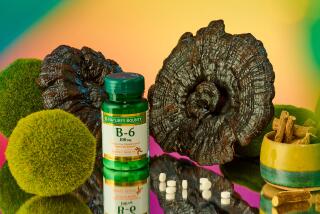Just How Intelligent Are Those ‘Smart Drugs’? : Trends: Proponents of the substances and researchers are at odds on effectiveness. Here’s an analysis of the claims and risks involved.
- Share via
The term smart drug or smart nutrient is used to apply to any product or compound made from naturally occurring or manufactured ingredients that is believed to stimulate the brain in such a way that a person can become more alert and energetic.
The word smart is used almost as a slogan. Researchers generally agree that basic intelligence cannot be greatly influenced, or influenced at all, by taking drugs or nutrients. However, advocates believe the products can greatly influence a person’s ability to speak more clearly, remember things and focus on the world.
Mental and physical functioning are partly governed by a group of chemicals called neurotransmitters. These chemicals carry impulses between tree-like nerve cells called neurons.
Two of the most common neurotransmitters are acetylcholine and norepinephrine, the brain’s version of adrenaline. Choline (a B vitamin) is necessary to stimulate the production of acetylcholine. Phenylalinine (an amino acid) is necessary to stimulate the production of norepinephrine.
Smart-nutrient advocates believe that after the age of 20, the production of acetylcholine and phenylalinine decline, leading to loss of mental and physical functioning. Stress also depletes these chemicals, and smart-product advocates believe humans often cannot make enough of these chemicals fast enough to prevent a loss of energy and brain power.
Advocates believe that by ingesting products containing these chemicals, or ones that aid in the manufacture of these chemicals, physical and mental functioning will be enhanced.
Nutrient formulas are created under the theory that optimum efficiency can be obtained through combinations of substances that enhance each other.
For example, Memory Fuel combines 17 ingredients, including Vitamin C, niacin and pantothenic acid with choline.
The theory about the process by which the smart drugs work is less clear.
The most talked-about drugs are called nootropics, a word coined to describe substances that improve learning and memory without harm. Largely experimental, nootropics are based on the neurotransmitter pyroglutamate.
Some smart drugs are drugs used to treat specific illnesses, but that some believe also can improve memory. Other smart drugs are said to work by increasing oxygen flow to the brain.
Here is a list of some of the smart drugs and nutrients and their possible benefits and risks.
* Hydergine. The most widely used smart drug, hydergine is an extract of ergot, a fungus that grows on rye. It reportedly increases mental abilities and prevents damage to brain cells from insufficient oxygen. Hydergine is one of the most popular treatments for senility in the United States. Considered relatively nontoxic, even at high doses, it is available with a doctor’s prescription.
* Piracetam. The most popular nootropic, it reportedly promotes the flow of information between the right and left hemispheres of the brain. In other countries, it is used to treat illnesses such as alcoholism and senility. However, it is not approved in the United States.
* Vasopressin. An anti-diuretic hormone, it is approved for treatment of diabetes. An inhalant, it reportedly provides an immediate increase in the ability to memorize and recall. However, its side effects are numerous, including nasal congestion, runny nose, abdominal cramps and headache. Available with a doctor’s prescription.
* Choline. A vitamin that is supposed to improve memory by stimulating the production of acetylcholine in the brain. Choline is the active ingredient in lecithin. Needs vitamin B-5 in order to produce acetylcholine.
* Caffeine. Used widely for its stimulant properties, it can increase short-term mental sharpness, but research shows it does not improve long-term memory. Unlike other “smart” drugs and nutrients, its high is usually followed by a low.
* Ginkgo biloba. The leaf from one of the oldest species of trees known, the ginkgo, is supposed to improve blood flow to the brain and, therefore, mental alertness. Available over the counter.
* Vitamins. Responsible for all of the biochemical reactions in our bodies. Most are considered anti-oxidants, which means they counter the process by which such things as sunlight, food and cigarettes combine with oxygen in our cells and interfere with our bodies’ efficiency. Some vitamins, such as niacin, also directly enhance the memory, some researchers believe. Vitamins are contained in food, and supplements are considered safe except in extreme doses in people with certain medical conditions.





